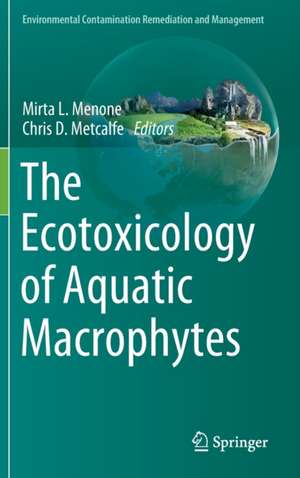The Ecotoxicology of Aquatic Macrophytes: Environmental Contamination Remediation and Management
Editat de Mirta L. Menone, Chris Metcalfeen Limba Engleză Hardback – iun 2023
Preț: 784.13 lei
Preț vechi: 956.26 lei
-18% Nou
Puncte Express: 1176
Preț estimativ în valută:
150.09€ • 163.09$ • 126.16£
150.09€ • 163.09$ • 126.16£
Carte tipărită la comandă
Livrare economică 21 aprilie-05 mai
Preluare comenzi: 021 569.72.76
Specificații
ISBN-13: 9783031278327
ISBN-10: 3031278321
Ilustrații: XV, 214 p. 47 illus., 39 illus. in color.
Dimensiuni: 155 x 235 mm
Greutate: 0.5 kg
Ediția:2023
Editura: Springer International Publishing
Colecția Springer
Seria Environmental Contamination Remediation and Management
Locul publicării:Cham, Switzerland
ISBN-10: 3031278321
Ilustrații: XV, 214 p. 47 illus., 39 illus. in color.
Dimensiuni: 155 x 235 mm
Greutate: 0.5 kg
Ediția:2023
Editura: Springer International Publishing
Colecția Springer
Seria Environmental Contamination Remediation and Management
Locul publicării:Cham, Switzerland
Cuprins
1. The Ecotoxicology of Aquatic Macrophytes: An Overview.- 2. Biomarkers in Aquatic Macrophytes: Traditional and Novel Approaches for Monitoring Responses to Exposure to Pollutants.- 3. Metal(loid)s in Macrophytes from the Americas.- 4. Global Perspective for the Use of Aquatic Macrophytes in Regulatory Risk Assessment for Contaminants.- 5. Wild Rice (Zizania spp.) as a Model Macrophyte Toxicity Test Species for Ecotoxicological Risk Assessment.- 6. Recovery of Freshwater Aquatic Macrophytes after Exposure to Herbicides and the Implications for Ecological Risk Assessment.- 7. Vegetated Ditches for Mitigation of Contaminants in Agricultural Runoff.- 8. The “Green Liver” Concept: Green Liver Systems as Low-Impact Systems for Bioremediation Using Aquatic Macrophytes.
Textul de pe ultima copertă
This book focuses on the topic of ecotoxicology of aquatic macrophytes and is wide ranging, including the use of macrophytes for remediation of contaminated sites. Many human activities are threats to the equilibrium of natural ecosystems. Pollution from point and non-point sources can be assessed using a variety of techniques, such as biomonitoring, biomarkers and biosensors. In aquatic ecosystems, biomonitoring of pollutants is mostly conducted by analysis of the tissues of invertebrates and fishes, and biomarker studies are also more widely applied to animals rather than in plants. Aquatic macrophytes occupy a key niche in aquatic ecosystems and provide a range of ecosystem services. In addition to their role in primary production, vegetation plays a key role in the cycling and retention of nutrients and generally acts as a sink for pollutants. Therefore, because of their importance to aquatic ecosystems, more attention should be paid to understanding the fate of pollutants and to developing methods to evaluate the health status of macrophytic plants in freshwater, marine and estuarine environments.
Caracteristici
Focuses on the topic of ecotoxicology of aquatic macrophytes Includes contributors who are internationally recognized specialists in this field Is wide ranging, including the use of macrophytes for remediation of contaminated sites









